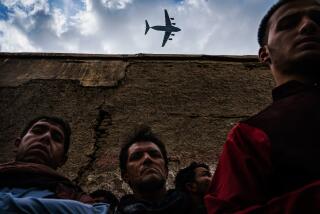Terrorism Fight Not a ‘Vietnam’
- Share via
Since the advent of television wars, which started with Vietnam, many Americans only accept our military incursions if they are fast with few casualties. Anything else is perceived to be “another Vietnam.” To those Americans, military incursions must be done as they were in Grenada or Panama or the 1991 Persian Gulf War.
But the war on terrorism doesn’t compare to any of these conflicts. It is more like World War II than Vietnam. This is a war for our own survival and the survival of Western civilization.
The only parallel between the war against terrorism and the Vietnam War is that we are again allowing the enemy to have “privileged sanctuaries.” This time they are not in Laos and Cambodia but in Syria, Iran, Lebanon, Yemen, Gaza and beyond.
In this war, we must regard terrorism as a “nation of terrorism” -- a chain of bases, headquarters, training camps, safe houses and other facilities that dot the map, going into and out of other states and enjoying a shield provided by those states. That shield must be torn down, not by declaring war against Syria or Iran or Lebanon or Yemen or Gaza, but by warning those governments that if they don’t destroy the bases of terrorists, the U.S. will.
Since 9/11, we have found ourselves engaged in something even larger than our war on terrorism. Last week, President Bush gave a speech at the National Endowment for Democracy that may well be remembered by the people of the world far into the future. We are embarked on the greatest and most moral pursuit in history: for all the people of the world to be free. “The freedom we prize is not for us alone, it is the right and capacity of all mankind,” he said.
We can’t help but be engaged in pursuing liberty for all because it’s inseparable from the war against terrorism. If we want to end terrorism, we have to pull it out by its roots -- economically, diplomatically, covertly or, if necessary, militarily.
There are many who will be against this pursuit. In early 2003, an actress made a television ad against U.S. intervention in Iraq and she looked at the camera and asked, “What did Saddam Hussein ever do to us?”
Questions of our foreign policy can generally be answered by recognizing that a nation is like a person, and the question should be posed that way: “If you and a number of your friends were walking on a street at night and saw someone being accosted, would you and your friends try to save the victim? Or if you felt you didn’t have the physical capabilities to enter the fight, would you call the police for help? Or would you take the actress’ option: walk away and ask, ‘What did the assailant ever do to us?’ ”
All people are born free, but throughout history that God-given gift has been a target of thieves. This country is on a journey to give back to the people the gift of liberty.
There are those who argue that this must be the business of the United Nations. How can it be when 72 governments in the U.N. do not believe in liberty? The U.N. can only be an organ for liberty when nondemocratic governments are prohibited from membership. Since that day has not come, but the war against terrorism has come, it is our nation’s destiny to pursue liberty for all.
There will, of course, be those who will simply say, “It’s nothing but another Vietnam.”
Only if we let it be.
More to Read
Sign up for Essential California
The most important California stories and recommendations in your inbox every morning.
You may occasionally receive promotional content from the Los Angeles Times.













